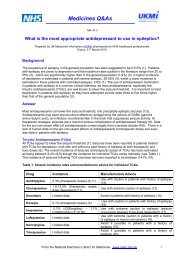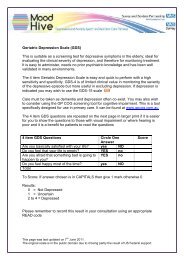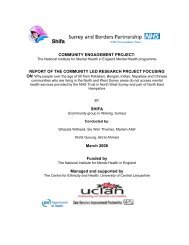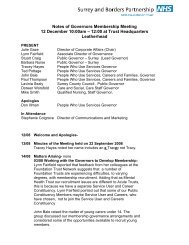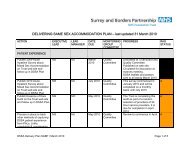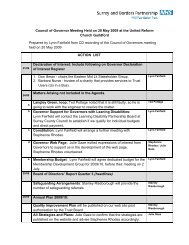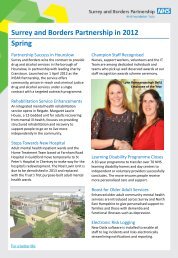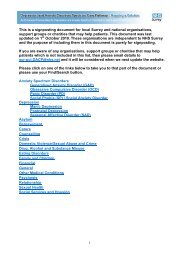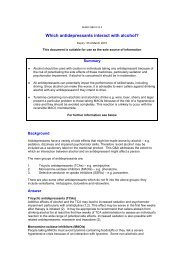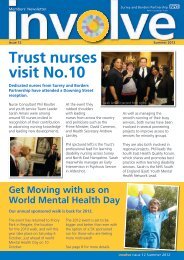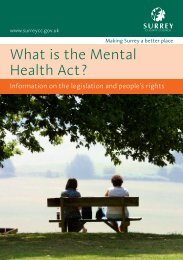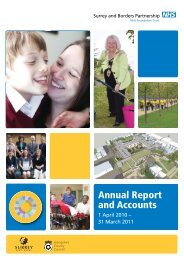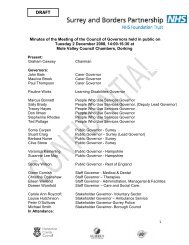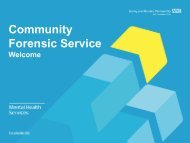Here - Surrey and Borders Partnership NHS Foundation Trust
Here - Surrey and Borders Partnership NHS Foundation Trust
Here - Surrey and Borders Partnership NHS Foundation Trust
You also want an ePaper? Increase the reach of your titles
YUMPU automatically turns print PDFs into web optimized ePapers that Google loves.
Editorial<br />
Let’s do some research<br />
June 2010 By Raj Persaud<br />
I was asked to write this by Dr Raja<br />
Mukherjee for our <strong>Trust</strong>’s new<br />
journal. <strong>Here</strong> it is…<br />
If we asked you to predict now whether<br />
you were going to perform some<br />
research <strong>and</strong> publish it, say in the next<br />
year, what would your answer be?<br />
Perhaps, from past experience you might<br />
admit that this is not likely. On the other<br />
h<strong>and</strong>, even if wasn’t particularly likely,<br />
you may also feel that gathering data is<br />
something that you ought to be doing,<br />
<strong>and</strong> given the social pressure <strong>and</strong><br />
management dem<strong>and</strong>s (me asking you<br />
publicly what your research plans are) you<br />
might impulsively declare, that yes<br />
research is something you are planning<br />
<strong>and</strong> intending.<br />
Now, here is the interesting research<br />
question – in merely asking you to<br />
predict the future – do we change it?<br />
Let’s say we ran an experiment where we<br />
divided a sample of the electorate into<br />
two groups, <strong>and</strong> for one, we asked them<br />
to predict whether they were going to<br />
vote or not, while we did nothing<br />
pertinent to the second group; they acted<br />
as a control. Now, if we followed these<br />
two samples up into the future, to<br />
examine what they eventually did in the<br />
privacy of the polling booth; the<br />
astonishing result is that being asked to<br />
predict the future...does change it.<br />
Those who are asked to forecast whether<br />
they are going to vote, tend to confirm<br />
they will, <strong>and</strong> to do so much more than<br />
would be expected from their past<br />
behaviour. They are responding to<br />
external expectation (<strong>and</strong> internal drivers<br />
of a similar nature) so they manage the<br />
impression they want to create of being<br />
responsible citizens, by predicting a<br />
behaviour they were in fact much less<br />
likely to perform in reality. Having<br />
foretold that they will take part in a<br />
ballot, they tend to go ahead <strong>and</strong> actually<br />
vote. Yet if they weren’t asked to predict<br />
the future, they were not particularly<br />
likely to do any casting at all.<br />
We can demonstrate this experimentally<br />
by comparing the group asked to predict<br />
the future with the control group, who<br />
were not asked to make predictions. This<br />
second group vote at the lower baseline<br />
rate of the general population, which is,<br />
not that much.<br />
Why does being asked to predict that<br />
you are going to vote, make it much<br />
more likely that you will?<br />
The short answer is that this particular<br />
psychological phenomenon, like most<br />
others, inspires many theories that<br />
attempt to account for it, but no one is<br />
exactly sure which is the truth. A seminal<br />
paper on this effect in the Journal of<br />
Consumer Psychology by Business<br />
Psychologists Eric Spangenberg of<br />
Washington State University <strong>and</strong> Anthony<br />
Greenwald of the University of<br />
Washington, pointed out that the trend<br />
could be used powerfully to manipulate<br />
large populations into behaviours they<br />
had previously little intention of<br />
performing.<br />
Spangenberg <strong>and</strong> Greenwald are<br />
probably the two world authorities on<br />
this intriguing ‘self-prophecy effect’ <strong>and</strong><br />
their paper entitled ‘Social Influence by<br />
Requesting Self-Prophecy’ showed how<br />
asking people to predict their own<br />
behaviour in the future was associated,<br />
on follow up, with spectacularly less<br />
cheating in tests, significantly more<br />
attendance at health clubs, <strong>and</strong> more<br />
voting.<br />
One theory is that we like to see<br />
ourselves as consistent creatures, <strong>and</strong><br />
having made a prediction of our<br />
behaviour in the future, not to confirm<br />
the prediction by performing the<br />
behaviour, would force us to confront a<br />
rather unpalatable truth; we are<br />
unreliable, inconsistent people who don’t<br />
know our own minds.<br />
4 <strong>Surrey</strong> <strong>and</strong> <strong>Borders</strong> Online Journal www.sabp.nhs.uk/journal



